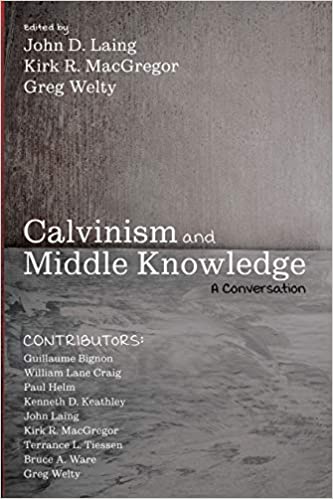A Brief Book Summary from Books At a Glance
By Randall K. Johnson
Introduction
Molina’s doctrine of middle knowledge is named after the class of God’s knowledge that exists between his natural knowledge and free knowledge. God’s natural knowledge is his knowledge of all truths that are necessary and independent of his will. God’s free knowledge is his knowledge of all truths that are contingent and dependent on his will. God’s middle knowledge is his knowledge of truths that are contingent but independent of his will. This middle knowledge is important because it allows God to know what free creatures would do in any given circumstance. Molinism, then, is the view that God’s act of creation was grounded in his knowledge of all possibilities (natural knowledge) and in his knowledge of how all free creatures would act in any given circumstance (middle knowledge). God’s free knowledge follows logically from his will to create this world.
PART I: MOLINISM, EVOLUTION, AND INTELLIGENT DESIGN
Chapter 1: Intelligent Design, Middle Knowledge, and the Problem of Creaturely Flaws
by John D. Laing
Laing proposes that the theory of middle knowledge helps to answer a popular objection to Intelligent Design: the problem of creaturely flaws. Intelligent Design is the view that the origin and development of biological life was the intentional work of an intelligent designer (e.g., God). The problem of creaturely flaws is a criticism against Intelligent Design that highlights the fact that many creatures have features that are seemingly useless and undesirable, e.g., vestigial organs. A theory of natural evolution can explain these features as evidence of the creature’s past ancestors. But Intelligent Design cannot appeal to the creature’s past ancestors. The problem is that “If there were an intelligent designer . . . then there would be no unused organs, appendages, or other body parts.” “If creatures have flaws . . . then either creatures are not designed, or the designer cannot be intelligent (or both).”
Laing sees a similarity between the logical problem of creaturely flaws and the logical problem of evil. Laing believes that Alvin Plantinga’s Free-Will Defense successfully solves the logical problem of evil and that there is a corollary to the Free-Will Defense which can solve the problem of creaturely flaws; he calls it the ‘Intelligent Mutation Defense.’ The Intelligent Mutation Defense shows that the doctrine of middle knowledge allows the proponent of Intelligent Design to appeal to “random genetic mutation and natural selection” without denying the intentionality of an intelligent designer, i.e. God. Laing puts forth two propositions:
If situation S prevails, then random genetic mutation M will occur
and
If situation S does not prevail, then random genetic mutation M will not occur.
He explains, “If these propositions are possibly true, then it is possible that the intelligent designer could not have developed creatures with the complexity they have without the flaws they have because S could involve undesirable mutations or the existence of useless organs.”
For an event to be random, it cannot be deterministically caused; it cannot be necessary or dependent on God’s will. Therefore, God’s knowledge of random mutation must be included in his middle knowledge. Furthermore, there is good reason to believe that God would value a world that included random genetic mutation. One could argue for example that “a world where creatures adapt to a changing environment is better … than a world where they do not adapt.” One could argue further that a changing environment is necessary for relationality among finite beings. Because it is possible that God could not have created a world with random mutation without creaturely flaws, and because a world with random mutation is better than a world without random mutation, the logical problem of creaturely flaws fails.
[To continue reading this summary, please see below....]The remainder of this article is premium content. Become a member to continue reading.
Already have an account? Sign In
